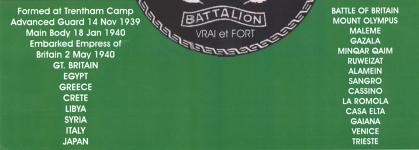TWENTY-SECOND TO NONE
The History of the 22nd (N.Z.) Battalion
By Terence Power Mclean
CHAPTER TWO
Preparation for Departure
13 Mar – 1 May, 1940
If reports were accurate, every member of the battalion spent his ten days of final leave in a state of continuous exhilaration.
There had been no such thing as the pain of parting.
The mood persisted for several days. It was not disturbed by the sober task
of 30 Mar, by which time most members had returned to camp, of lining Wellington streets from Parliament Buildings to the Justice Department building
in Lambton Quay, for the State Funeral of the Prime Minister, the Rt Hon M J Savage, PC. It accounted for the number who returned late from final
leave with stories of too many parties.
In the mood, the men wanted to be done with training. They wanted to be aboard ship,
bound for a war destination. They did not take kindly to official repots of delays in shipping arrangements and at odd times, a number impatiently
ducked through the back fence of the camp for a freedom for which they suffered the commanding officer’s rasping “Twenty-eight days!” upon their return.
Sport activities were increased in an effort to combat the mood. Wednesday and Friday afternoons were set aside each week for organised
sports, cricket being the chief game, and on other days cross-country running, Rugby football, softball and various other games were played. The accent
in military training was placed upon shooting and the ranges were frequently in use, especially by men who had shown indifferent skill in earlier practices.
Bren guns, too, were fired and two night exercise were staged.
In mid-April, the battalion moved from tents to huts which had just been completed. The increased comfort, especially in the autumnal
weather now being experienced, was great.
The whispers of a sailing date sounded through the battalion like the rustling of leaves in a wind. The authorised marking of
clothes pointed the date. Vaccination made certain the time could not be far away. And the publication of an order relating to a State reception and
a farewell march through the streets of Wellington on 27 April clinched the accuracy of the rumour that the departure would be about the end of the month.
The general excitement affected the workings of the committee self-appointed to protect the interests of Borax. Soon after return from final
leave, the committee had addressed a notably respectful request for permission to take the dog overseas. The request had been declined and the
committee, “in committee”, after expressing its disapproval of the reply in the strongest terms, determined upon ways and means. In pursuance of these,
Pte Booth and comrades of A Coy acquired an extra kitbag from the QM store and at odd times practised the odd manoeuvre of securing Borax in the bag, with
just his nose showing, and carrying him up and down a ladder placed against the boiler house. Borax never wanted in intelligence and he soon caught on, but
he was not quite well-bred enough to conceal a look of utter desolation and disgust whenever he saw Booth and his henchmen arranging another practice, down
behind the showers.
Anzac Day was fittingly remembered by a special parade of the Battalion. Col Andrew, after many days of watching the coys, at last decided
that he could not separate A and C Coys in the competition to discover the most efficient marching company to head the unit in the farewell parade and C Coy
won the call when a coin was tossed.
The training for the farewell march was intensive. On the morning of 27 Apr, the battalion was entrained at Trentham at 0745 hrs and
before then it had been assembled with due formality on a parade in camp. From the Wellington station, it marched to Parliament Buildings for the farewell
speeches. The flow of oratory was somewhat checked by light showers of rain. As the unit left the ground, it paid a salute on the march to the new Prime
Minister, the Right Hon P Fraser, PC, CM.
The crowd in the city was large all along the route of Lambton Quay, Willis St, Wakefield and
Victoria Streets and Jervois Quay to the station. Members of the First Echelon, a few months before, had made the first march of the new war through the city.
In the time since, despite the “sham” war on the Western Front, there had been a growth of war fever among the people and the occasional cheering and clapping
of the crowd as the battalion marched by expressed a little of the fever. It seemed inexpressibly sad that some of the bands should choose to play “Tipperary”,
with all its haunting associations of mud and misery and death, but the general mood was of hope, not of sadness, and “Tipperary” on the day was just a song of
which everybody knew the words.
As a farewell, the march was a moving experience for the men of the battalion. They were pleased when told that the colonel had praised their
bearing and marching, for they had come to consider him their severest critic, but in the hours following the return to Trentham and on the next day, when the
camp was thrown open to civilian friends and relatives, it seemed to many of the unit that they had unconsciously passed into a state of suspension between
exaltation and grief. They had spent nearly four moths in camp. In lean fitness, they were unrecognisable from the men who had entered camp all through January.
Now the time was coming when they would be, in fact, soldiers. The imagination could not yet grasp the utter contrast with the previous life.
On the morning of Sunday 28 Apr, an advance party headed by the colonel departed for the ship. The excitement soon became frantic. Before Anzac Day,
there had been much talk of sport and some excitement when D Coy, captained by Sjt T C Fowler, won an inter-company Rugby competition for a cup presented by
the people of Hawke’s Bay. There had been some celebration when Fowler, Cpl M Ashman, L/Cpl P Donoghue and Pte R Ayres had been chosen from the battalion to
represent Trentham Camp against Burnham on 26 Apr. But sport now was of complete inconsequence. The ship, the destination, the prospects, these were the matters
of importance. On the last night in camp, on 30 Apr, a cyclone passed rapidly through the wet canteen into the huts. At a word, a man would tear the paillasse of
a mate into shreds and scatter the hay, or he would find fun in jumping on a slat bed and crashing wit it to the floor. The cyclone had a happy, explosive violence.
The mess, it seemed, would have to be cleared up. All day long, men swept and swore and carried and cursed, but at 1830 hours, when the last inspection was made,
there were no complaints on either side.
Kitbags were stacked for the baggage party. The battalion paraded. The wait, as always, was long. A strange quiet settled. The hold on the
familiar was slackening. The rustle was loud when the battalion at last straightened for the march to Trentham station.
The transport, according to the Army, was the X3. It soon proved to be more exciting than the dry nomenclature suggested.
It was the Canadian Pacific liner, Empress of
Britain, of 43,000 tons, one of the largest and most luxurious liners in the world. Even Lt Lovie, a Great War veteran whose invariable reply to complaints
had been “You ain’t seen nothing yet!” was silenced by a size and quality of transport undreamed of by soldiers of the First World War.
The battalion filed silently aboard. Borax was put in his bag and carried up the gangway and not a member of the embarkation staff
thought anything was amiss.
The hold on the familiar things had become tenuous and Trentham was now only a place in the battalion’s history.
|



